#d'oc language
Text

@landcrowe yep, it is!
But the history of this word is vert interesting in fact.
Gabacho/a comes from Occitan - of pre-Roman origin - gavach, which means "a person that suffers from goiter" or, more extensively, "a person that speaks wrong". But if we look at how the word is used in different languages we'll notice that it's also used to speak pejoratively of the people that live north from you. But why?
Because in the 16th century the area known as Granda Gavacheria - that included Bordeaux and Les Landes -:
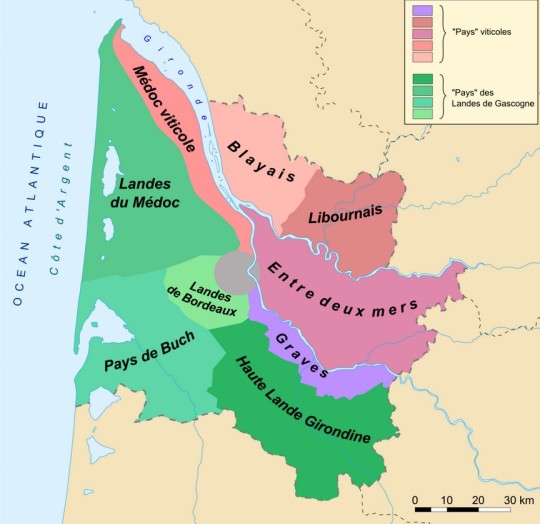
was so decimated and impoverished after the plague that its lords relied on foreign handwork to work in the abandoned fields. These settlers came indeed from the north, and spoke French and not Occitan, so they spoke wrong. And locals started calling them gavaches. In fact, this area welcomed so many foreigners that it became an island of langue d'oïl in a sea of langue d'oc.
Some examples so we see gabacho actually means "someone from the north that speaks other language":
The Catalans from Pyrénees-Orientales to their Occitan-speaking neighbors from Òpol e Perilhons.
In Spain, it's used to call any French person.
Also in Mexico is used for the gringos, the neighbors from the north!
Another examples of gabachos would be the Swiss for the Italians, or the Romanians to the Bulgarians, or the Guianans to the Brazilians.
Use the word wisely!
#euskal herria#basque country#pays basque#pais vasco#euskadi#spain#culture#occitan#france#words#history#fun fact#interesting
37 notes
·
View notes
Text
we were chatting about Eurovision with @lesbiansandgayssupporttheminers just now and the whole "quashing the diversity of national/regional languages" thing, like how France made such a big deal out of having a song in brezhoneg last year but you'd have to hold them at gunpoint to get songs in the languages they're more actively trying to kill, such as the langues d'oc (occitan, provençal and so on) and basque
anyway we think there should be an alternative non-competitive extravaganza to showcase the endangered languages and we could call it:
Eurovision II: Eclectic Boogaloo
oh and it goes without saying that it should be as queer and camp as fucking possible
33 notes
·
View notes
Text
I was thinking about what language to use for the Fae language in my Twst Universe and thought about using the language used in France between 1200-1300 - my idiot me decided that since "Sleeping Beauty" is set in that period it would make sense to use that period as a reference -
The problem is that the language we're talking about is 'langue d'oc' and I don't understand anything about it.
And then nothing.
Little sad me.
I'm sulking right now, and I'm bitter about my plan being completely ruined, and now I need an alternative ( and using latin is my last hope)
That's all folk
6 notes
·
View notes
Text
Medieval Europe and SW Asia in One Post
Fun fact for those outside the US: Americans are mostly taught the history of our own country in K-12 schools. (In some states, badly.) We get 9-10 years of US history, 1 year that’s divided up between Civics (how the US government works) and the history of the individual state you’re in, and 1-2 years of World History that does NOT cover anything in Europe or SW Asia after the fall of Rome. Which means that to learn that stuff, you either have to take those history courses in college/university, or do a lot of independent reading.
I did a lot of independent reading.
So here’s a brief overview in very broad strokes of Europe and SWA from roughly 450 - 1600 CE. If you want to know more, I highly recommend the YT channel Extra Credit Extra History. It is well-researched, worded in a way that isn’t as horribly dry as the Durants’ books, and comes in bite-sized pieces that you can enjoy on the go.
(History behind the cut.)
The Fall of Rome and the Early Middle Ages
OK, first of all, only the western half of the Roman Empire actually fell in the fifth century CE. Everything from roughly Greece on eastward stayed Roman under the new capital of Constantinople. Constantinople had its own large library and was a center of learning and culture to rival Rome in its heyday. (This is important to remember for later.)
In Europe, you mostly had a bunch of tiny kingdoms under feudal lords, with the Catholic Church being a sort of cultural glue holding everything together. Most people were illiterate, but the Catholic clergy kept as much ancient knowledge preserved as they could, all in Latin. Most people could speak Latin as a result of the Roman Empire taking over their country a few centuries back, so it made sense as a universal language for Europe.
Because most educated people were in the clergy, the Catholic Church became not just a major religious power, but a huge political power as well.
Meanwhile, the Arabian peninsula was mostly a bunch of warring tribes until the late 7th century CE, when this guy named Mohammed united the Arabs under a religion he called The Way of Peace, or as most of us know it today, Islam.
The Muslims proceed to not only form a pretty strong nation known as the Caliphate, but to take over almost all of SWA (Constantinople and a bit of modern-day Turkey held firm), the Sahara Desert, and the Iberian peninsula (modern-day Spain and Portugal) within 100 years of Mohammed’s death. This is one of the most rapid expansions of an empire in history. Everybody was taught Arabic, and the Caliphate took a strong interest in learning and preserving as much knowledge as they could. In terms of cultural advancement, you could think of them as basically Rome 2.0.
In the 9th century, this guy known as Charlemagne the Frank is crowned Holy Roman Emperor by the Pope and proceeds to take over France and most of central Europe. He stops the expansion of the Caliphate from going past the Pyrenees mountains too. The Holy Roman Empire (which still doesn’t actually include any of Italy, much less Rome itself) remains a major player for like 900 years.
France itself has two French languages by this point, named by how you say "yes." Langue d'oui will become standard modern French. Langue d'oc, also known as Occitan, is still spoken to this day but is slowly dying out.
Britain and Ireland are, at this point, minor insignificant little islands that nobody in mainland Europe cares about, except for the Vikings, which do a lot of pillaging and also establish quite a few towns and territories in Ireland, Britain, and an area of northern France that gets the name “Normandy” from all these Northern invaders.
Meanwhile, a bunch of feudal lords are expanding their holdings into little kingdoms, bringing about the High Middle Ages.
The High Middle Ages
Then in 1066, a couple of centuries after the Vikings settle in Normandy, a Norman named William decides to conquer England. All of England’s royalty for the last 1000 or so years have been descended from William the Conqueror.
Meanwhile, the Ottoman Turks have taken over the Caliphate and called it the Ottoman Empire. This empire will stand until WWI (no really).
“Oh No,” says Pope Urban VI, “Muslims have taken over the Holy Land! That’s where Jesus lived and stuff!” So he begs the nobles of Europe to go on a crusade to take back Jerusalem. This goes horribly. There are ten Crusades over the next couple of centuries. They are mainly notable for how sadistically cruel European knights were in their butchery of the Jewish and Muslim people living in the Levant. None of them succeed at retaking it.
Meanwhile, Eleanor of Aquitaine, a French noblewoman, marries King Henry II of England. If you know the Robin Hood story, then you know her 2 kids: Richard (the Lionheart) and John II.
John II was disliked by the people because he was very, very bad at making war. So the nobles came up to him and had him sign the Magna Carta, which established the British Parliament.
Traveling minstrels called troubadours are totally the latest musical craze at this point. They mostly write in Occitan and are the source of a pretty big chunk of the European secular music that's survived from the Middle Ages.
In the 12th century, the Ottomans finally do what they’ve been trying to do for centuries and take Constantinople. And one of the first things they do is start translating all the ancient books into Arabic so they can learn lots of Cool Stuff.
Traders then bring this Cool Stuff, including new numerals they adapted from the ones used in India, to Europe, where it gets translated again into Latin and the educated classes go gaga for all the new old knowledge.
But wait, time out, says the Catholic Church. You can’t use those new Arabic numerals. The Roman numerals are what we’ve been using for centuries and we’re pretty sure that it’s like, blasphemy or something to not use Roman numerals. A bunch of cities actually banned Arabic numerals for years until the Church came around and realized that God probably doesn’t care how you write numbers and also Arabic numerals are way easier to work with.
The Late Middle Ages a.k.a. The Renaissance
So now we’ve got good times in Europe. Kingdoms have been gradually expanding, so there are fewer tiny little fiefdoms dotting the land and more moderate-sized kingdoms. Traders are getting Cool Stuff from Asia. Crops are doing well. Yeah, things still suck if you’re Jewish, but for the Christian majority, things are going pretty good.
And then the plague happened.
The Black Death killed off about 1/3 of Europe’s population at the time, and kept coming back in waves from 1352 all the way to 1666. Nobody knew exactly how it was spread, except that it might be through the air. It’s terrifying for everyone, because unlike famines, the rich can’t buy their way out of a plague.
At the same time, things are heating up in England and France.
You know how Eleanor of Aquitaine was a French noblewoman? That technically, according to France, made the English king a vassal, or subject, of the king of France. And Edward III was all "No way, bite me" and France was like "Yo mama" and they started the Hundred Years' War.
(It was technically 119 years long, but when the war's that long already, what's a couple of decades, amirite?)
England ended up taking over most of France at one point, a French peasant girl named Joan wore armor because she believed she'd gotten a message from God, and by the end, France owned France again.
Meanwhile, England had just gone from "a tiny insignificant country on some island that Europe doesn't really care about" to a major player. They fought a war against France! And held their own for most of it! And France had been a big deal pretty much since Charlemagne!
The Bohemians in what is now the Czech Republic tried to start their own church and their own democracy in one fell swoop, and the Church came down hard on them.
The Cathar Christians in the region of France known as Albi caught the Church's attention as well, and since the Cathars were essentially heretics, the brutal Albigensian Crusade wiped out entire villages.
Meanwhile, the Church's view on witchcraft has changed.
See, for most of the Middle Ages, the official view was that if you accused your neighbor of witchcraft, that meant you were a heretic, because you believed in supernatural powers other than God and the devil. So people didn't do a lot of accusing people of witchcraft.
But with plague going on, and people needing easy scapegoats, and a lot of medieval people really hating on women (see: Thomas Aquinas, Martin Luther, and the dude who wrote the Malleus Malificarum), you had a recipe for Bad Times. Jewish people, people with leprosy, and Romani were blamed too, because they got blamed for most everything. But now, people were very focused on the idea that the devil was making trouble by tricking women into practicing the Dark Arts.
Thus, western Europe began hunting "witches." This is not the same thing as the Inquisition, although they happened at the same time. And no, most of the accused were not actually witches, nor were they Pagans. Wicca didn't exist yet either. Please stop stating these things as undisputed fact. I am begging you.
This also meant that a lot of zealous would-be witch-hunters were killing cats, and since cats keep the rat population down, and the plague was spread by the fleas on those rats, you can imagine how well that went.
Anyway, despite all the doom and gloom, Italy was having a Renaissance of ancient art styles, featuring cool people like Leonardo da Vinci, Michelangelo, and a bunch of other dudes who didn't have Ninja Turtles named after them but were still pretty great.
In the Holy Roman Empire, this dude named Gutenberg figures out movable type, and immediately uses it to print out Bibles in both Latin and German, so that everybody can read the Bible and you don't have to go all squinty reading hand-written copies in the church that are so expensive that they have to be chained down.
And then there's Spain.
The Reconquista and Why It Ruined Everything
Spain, as you'll recall, was mostly ruled by the Ottoman Empire. There was a lot of splitting up and reshuffling of kingdoms there for a while, but in the late 15th century, the young rulers Ferdinand of Castille and Isabela of Aragon decide to take Spain back. And since they're Catholics, this Reconquista (literally "reconquest") basically meant "kick out all the Jews and Muslims from Spain and take all their stuff."
So now the royal couple has a ton of stolen liberated gold in the treasury, and they want to trade with the Indies and get even richer. And when this dude from Genoa comes along saying he thinks the earth is smaller than everybody says it is and you can totally just sail west to get to the Indies, Isabela's like "Sure, I've got money to burn. Here are 3 ships."
And that is how Christopher Columbus ruined everything for the Native Americans, and as an added bonus, introduced syphilis to Europe and ruined things for a lot of people there. But the Spanish got rich AF and that's what matters, right?
Meanwhile, because Spain is Catholic now, it gets permission from the Church to run its own special Inquisition in order to find any remaining Jews, Muslims, or heretics in Spain. If you know anything about the Spanish Inquisition other than the Monty Python meme, then you understand why this is a Very Bad Thing.
The Sixteenth Century
At the same time, Spain was also fighting England and France over Flanders.
Not Homer Simpson's neighbor but the region of Flanders, which is now Belgium and parts of the Netherlands. Everybody basically wanted to take over Flanders and get hold of its awesome natural resources.
Everybody also wanted to take over as much of the New World as possible and send expeditions over there, especially since there was a chance there might be a Northwest Passage to Asia so they can get those sweet, sweet Asian spices without having to travel overland. Unfortunately, the Americas go north as far as the ice caps, and south almost to Antarctica (which the Europeans still don't know exists yet), so that's not happening.
In Rome, the Catholic Church is using money from the sale of indulgences to build some church or whatever. Martin Luther, a German monk, is Not Amused and nails up 95 reasons why, thus starting the Protestant Reformation.
In England, Henry VIII is busy having a lot of wives, starting his own church, and basically being a rather poor king, overall.
The Portuguese are mad because they feel like they've gotten the short end of the stick. So the Pope decrees that everything east of a certain latitude in South America goes to Portugal, and everything west of the line goes to Spain. Which would be awesome except that South America has a lot more land west of the line than east of it. But the kings of Spain and Portugal are bound by the Church's decree, and there are no take-backsies.
Spain has the most powerful navy in Europe at this point. It's even called the Invincible Armada. Until 1588 when Queen Elizabeth I raises up the new most powerful navy in Europe and kicks the Armada's collective ass.
Meanwhile, a fringe sect of Christians in England believe that the Anglican Church is too much like Catholicism. One group believes that it needs to be "purified" of Catholic influence. The other believes that they need to just completely separate from the Church of England altogether. Because these are views that could easily make you a head shorter (if you get my meaning), they move to the Netherlands, where there's freedom of religion. This is unusual. In most of Europe at the time, you had to be the same exact kind of Christian as the king, or at least pretend to be. Anyway, this is a fairly small group of people, and I'm sure they'll have no real influence on events in the future--
Ohmygod, they just settled New England. And rather than wanting freedom of religion, they want everybody to follow their church. Whoopsie.
So that's the Middle Ages in a nutshell, or at least the parts of it that I know about and can remember off the top of my head. Please read more about this stuff instead of relying solely on this post. It'll get you a bit of knowledge, but it's hardly the equivalent of taking an entire course on medieval history.
#history#medieval history#europe#european history#world history#ottoman empire#ottoman history#fall of rome
5 notes
·
View notes
Text
During the late Middle Ages, the Occitan regions of southern France had a distinct cultural and linguistic identity that set them apart from the rest of France. The Occitan language, also known as Occitanian or Langue d'Oc, was widely spoken in the region and was distinct from the French language spoken in the northern regions of France.
The Occitan regions also had a long history of political autonomy, with many towns and cities governed by their own councils and rulers. In some cases, these rulers formed alliances with neighboring towns and cities to form larger political entities, such as the County of Toulouse or the Duchy of Aquitaine.
However, it's important to note that the idea of a distinct Occitan identity did not necessarily translate into a desire for political independence or separation from France. Many people in the Occitan regions saw themselves as loyal subjects of the French crown, and the region remained part of France throughout the Middle Ages and into the modern era.
That being said, there were periodic conflicts between the rulers of the Occitan regions and the French monarchy, particularly during the Hundred Years' War between France and England. The Occitan regions often found themselves caught in the middle of this conflict, with various factions pledging loyalty to different sides.
Overall, while the Occitan regions of southern France had a distinct cultural and linguistic identity during the late Middle Ages, their relationship with France proper was complex and multifaceted, with a long history of both cooperation and conflict.
0 notes
Text
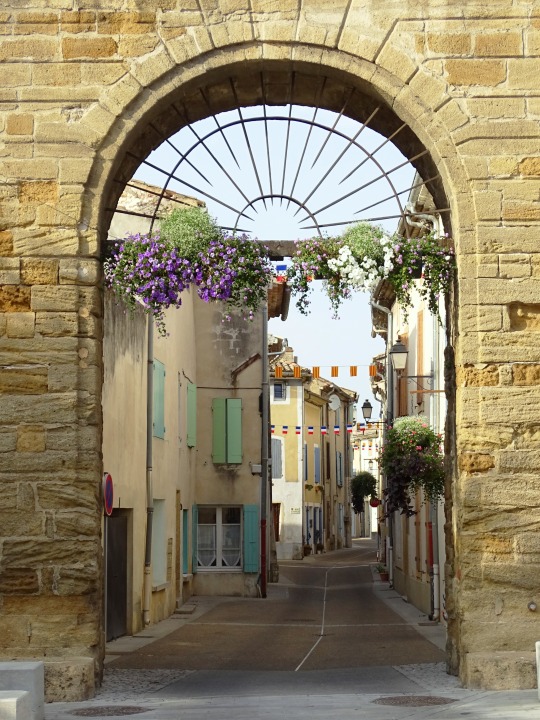
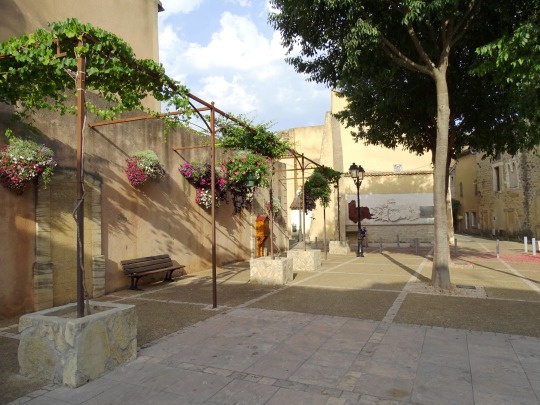
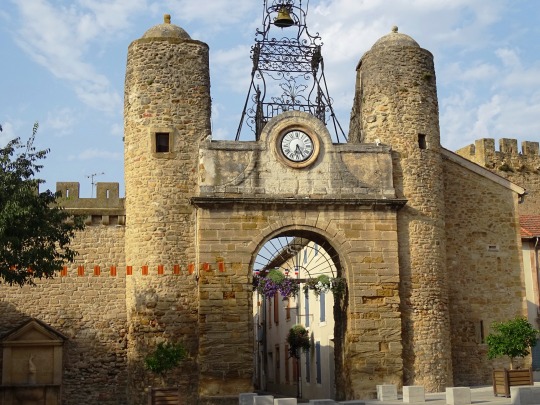
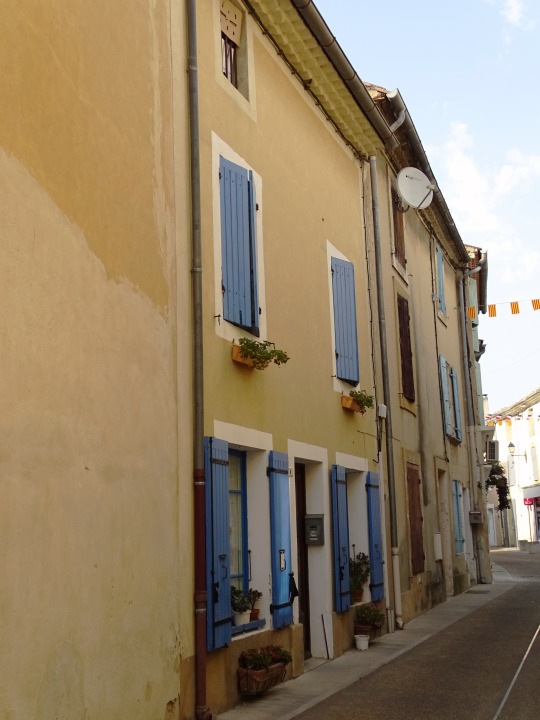

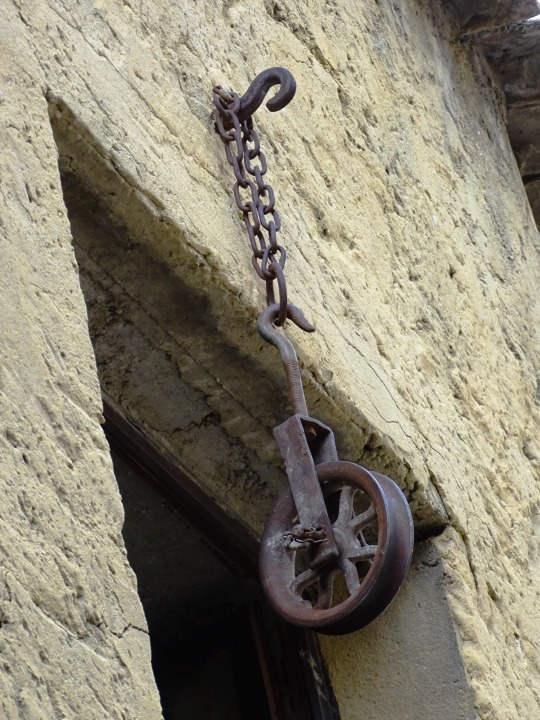




Camaret-sur-Aigues, France (No. 4)
But this square is also intended to welcome tourists. From the outset, the town hall has worked with the Aygues Ouvèze en Provence Community of Communes to ensure that these places are a means of promoting our tourist assets and our local productions. This is how the idea of the Maison des Vins et des Produits du terroir and a bicycle room was born.
This square, by its history, by the quality of the works and developments that have just been carried out there, by the place of tourist reception and the enhancement of our local wine and agricultural productions, is rooted in our Provençal identity.
This is why the City Council approved the proposal made by Mayor Philippe de Beauregard to name this new communal space: Place des Félibres.
The Félibrige movement was founded in 1854, on 11 May, the feast of Saint Estelle, by seven young Provençal poets and writers: Frédéric Mistral, Joseph Roumanille, Théodore Aubanel, Jean Brunet, Paul Géra, Anselme Mathieu and Alphonse Tavan.
The founders wanted to turn it into a literary movement, an academy, a philosophy, a militant school at the service of the culture and language of Provence and the langue d'Oc, as Mistral had resolved at a very young age (quote): "I resolved: firstly, to revive, to revive in Provence the feeling of belonging that I saw being annihilated under the false and unnatural education of all the schools; secondly, to bring about this resurrection by the restoration of the natural and historical language of the country, against which the schools are all waging a war to the death; thirdly, to restore the vogue to the Provençal language by the influx and flame of divine poetry."
The inauguration of this Place des Félibres took place on July 13, 2021 in the presence of more than 400 people.
Source
#Camaret-sur-Aigues#Porte Carbonnel#Rue du Portalet#Provence-Alpes-Côte d'Azur#Vaucluse#Carpentras#Vaison-la-Romaine#summer 2021#France#Europe#travel#original photography#vacation#tourist attraction#landmark#architecture#cityscape#small town#village#flora#clock#flower#fauna#bird#evening light#ruins#Grand Rue#la porte de l'Horloge#Le Ravelin
0 notes
Text
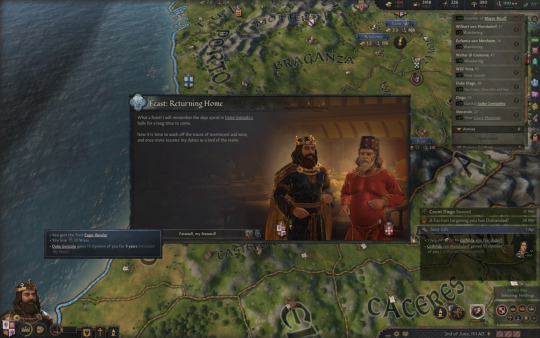

After attending the feast of one of his vassals, Duke Gonzalo of Coimbra, King Fernando gained the trait of Eager Reveler.

King Fernando's efforts to learn the D'Oc Vulgar language which is the language of his wife Queen Joana as well as the Occitan peoples of southern France, ends in failure and he gives up on learning it.
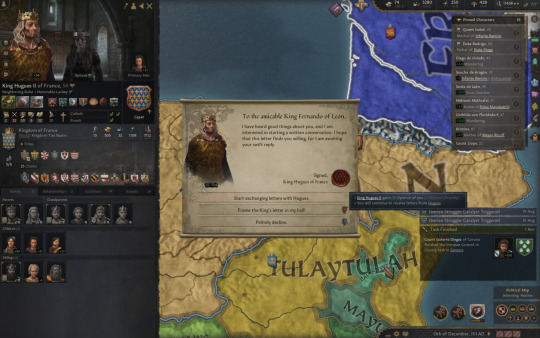

We receive a mini-event chain of having correspondence with the King of France, King Hugues II of France. King Fernando opts to discuss about military strategies as he has heard rumours this topic is close to King Hugues heart.
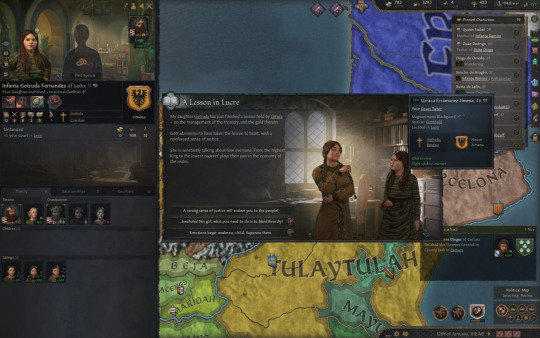
Meanwhile, King Fernando's daughter Infanta Gotruda takes the lesson from the Court Tutor Infanta Urraca to heart on the good management of the treasury, and gains the trait of Just, like her father.
0 notes
Text
Languedoc Region Coffee Mill
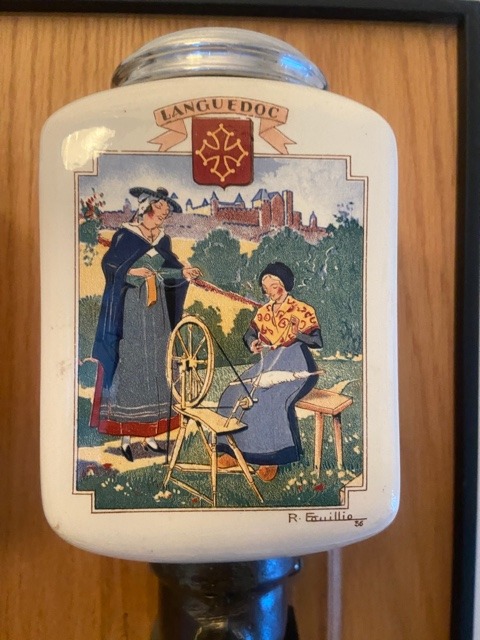
Since 2016, the area known as "Languedoc- Roussillon" has been merged with neighbouring Midi-Pyrénées into a new super-region that has taken the name "Occitanie" - a historical reference to the part of France where until the nineteenth century most people spoke varieties of Occitanian French, not the standard French of northern France.
The area known as "Languedoc", covered a larger part of southernFrance, indeed much of modern Occitanie and Provence. The name itself is a reference to the language(s) (Les langues d'oc - see below) spoken in this part of France in past centuries. Roussillon is a much smaller area, being more or less the area covered by the Eastern Pyrenees department. Roussillon, in the past, was the northern part of Catalonia., and people here still speak Catalan as well as French.
Languedoc specialties include: poultry, snails, cassoulet, cod brand.

Key Elements in the Design of the Languedoc Hopper



0 notes
Note
[rain] and the langue d'oïl was mostly used since you know. most royal territories were in the north. but the langue d'oc which was much more connected to latin and roman languages (by virtue of it being situated next to italy) still gave some words to french as we know it, and we also have roots derived from francs. tl;dr french is a mix of latin roots and weird franc roots that are also somewhat germanic and bc of its history the northern language was chosen which made it less latin.)
0 notes
Photo









Language Moodboard: occitan / lenga d'òc
for @asnowballschance
#i hope you like this!#occitan language#lang d'oc#minority languages#langblr#occitan langblr#learning occitan#language moodboard
73 notes
·
View notes
Text
does anyone have good resources for studying langue d'oc? specifically gascogne
#its my dads mother tongue#language learning#occitan#langue d'oc#idk what else to tag it lol#french#language#linguistics
1 note
·
View note
Video
youtube
The Sound of the Occitan language/ Languedocien dialect (Numbers, Greetings and “The Wren”)
32 notes
·
View notes
Text
So Twi’leks have a quasi-French accent in the SW animated series, but do they have a particular accent in the French dub? Is it like a regional French accent, or something else entirely?
#star wars#twileks#language stuff#random thoughts#la guerre des etoiles#I'll imagine the Syndullas with a langue d'oc accent until I'm told otherwise
0 notes
Text
some of the funniest reviews I have ever gotten on my fic are ones where the reviewer doesn’t seem to get that I as the writer have thought way harder and way longer about the fic than they have
from questioning the position I have given a character in an AU to where I should have split up a one shot into two chapters
but one of the funniest ones was on an Assassin’s Creed fic of mine where this reviewer was like you know Altair speaks English right?
and I presume from that they meant that Altair should be able to speak English with Connor and Desmond
for those who don’t know Assassin’s Creed, Altair lived in roughly what is now Syria in 1191, Connor Kenway is from New York during the US War of Independence, and Desmond Miles is from New York in 2012 & I presume that the reviewer is taking Altair’s ability to speak English from a conversation that Altair had with King Richard I of England in the first game, & one of the aspects of the game is the technology used to access Altair and Connor’s memories also automatically translates anything they read or hear into modern English most of the time so you don’t actually which language they may or may not be speaking at that time because it’s all English
and I do agree that Altair speaks English but it’s not going to be intelligible to Connor or Desmond (especially not when English is Connor’s second language) and it’s because I did my research and made the best judgements I could using what’s canonically available so here’s the process
1. The English spoken in 1191 is Middle English, and for reference on how intelligible that would be to a modern English speaker if you find Shakespeare hard to read he actually used early modern English around 1500, that’s your reference point, Connor’s English is closer to Desmond’s English than Altair’s English is to Connor’s, and Connor comes from a time when macaroni was slang for high class men’s fashion
2. King Richard I of England didn’t speak English, he was Norman and spoke French, and the English courts at the time used French or Latin, in the game he is given an English accent as a counter to a French character who speaks English in a French accent and it can work out because during that time period, Old French was spoken in northern France and Occitan (also known as Langue d’Oc) in Southern France, so he either spoke Occitan and Altair knew that as well or he spoke French with an Occitan accent, or maybe he spoke a different dialect of French than the Norman one (and Richard I historically spoke Occitan too so)
3. You might be asking, if King Richard didn’t even speak English how could you tell if Altair knew it? The answer is, Altair was able to understand any foot soldier he came across and that’s who from England would be speaking English, and more specifically the middle English that isn’t ineligible to modern English speakers
4. Why does any of this matter? Languages are cool bro and if I’m going to write a language barrier into the story I’m gonna fucking do it right
5. How many languages does Altair speak then? Excellent fucking question, just from the crusaders he’d have to know English, French, German, and Latin probably and as for the natives to the region he’d probably have to learn a lot more but I couldn’t find good info on what all languages were used in the region during that time because everyone is all about the crusaders, but there are 5 main languages in the region now which are Arabic, Persian, Turkish, Kurdish, and Hebrew, and Saladin spoke Kurdish and Arabic so I’m usually like probably at least 8 because it’s all way more complicated than I made it out to be in this post
and yes I wrote this all out to promote my headcanon of polyglot!Altair
#altair ibn-la'ahad#Assassin's Creed#language headcanons#Occitan is still a language#it's not dead it's just not French or considered a French dialect#in the 12th century it was kinda considered a French dialect hence the langue d'oc distinction
3 notes
·
View notes
Note
hi i’m really sorry to bother you but you’re the only person i know of who’s a native french speaker and can probably answer this (or at least i hope you are otherwise this will be hella embarrassing lol) anyway you know how english has many different types and like accents and everything? like british vs american vs australian type. is that a thing for france? like different parts of france/different french speaking countries having different accents and slang. also is old french a thing. like old english. i tried to google it but i’m stupid and couldn’t find a clear answer. ALSO i know france colonized a lot of different places do those places have their own ‘version’ of french? like a vague example would be pigin, in hawaii we have hawaiian obv also a bunch of other polynesian languages but we also have pigin which is a mishmash of languages that people created to speak to eachother in plantations. sorry this is dumb and totally out of the blue i’ve just been thinking about this for a long time
I love talking about this shit so thank you for asking lmaoo
There absolutly are different accents!
You have all the accents from the countries France colonized, such as Quebec, Belgium (very strong accent, which also changes depending on where in Belgium), Switzerland, as well as all the islands France colonized like Martinique or Guadeloupe (these countries have also their 'own' version of french like you said! It's called créole antillais, but I am not knowledgable enough on that to talk about it further), and several african countries like Congo or Senegal.
I'd say this video sums it up pretty well (it has english subtitles)
All of these have their own cultures, and so have different slangs and words as well. The most common example would be how Belgium do not use the infamous "quatre vingt dix" (four twenty ten / 90) but instead say "nonente"
BUT we also have accents within mainland France itself!
I’d say the most stricking one would be the south accent, especially the one from Marseille (because yes, each main city as their own accents basically).
But there is also the north accent, as well as several accents from the middle of France, Alsace (which has heavy german influences), or even Paris. I think the place that is considered accent-less is Tours.
But people lose their accents easily, and so most young people, since they move around and meet new people, lose those accents.
And for old french, it's a bit trickier, since France is very old and used to have different languages depending on where you lived, the main two being langue d'oïl (upper half of France) and langue d'oc (lower half of France), thus explaining the drastic different accents, but there was actually even more languages lmao aaaand there are several "old french"
First would be when it was a rough mix between common latin and gallic in Antiquity.
Then gallo-roman during the end of Antiquity and beginning of Middle Age
Then what is called "old french" , and after "middle french", during the plague, which was a wild mess.
(I need to add that in all these steps, european languages took words and grammar rules from each others)
Then we get to the Renaissance with the "classic french", and more rules are established. They establish the langue d'oïl as the main language and stop lusing latin everywhere (which was still used in official papers and stuff).
After the french revolution they realized practically no one actually talks the main language and actively fight against the other languages to impose modern french.
If you read old french books or plays, like Molière, you won't see much differences from the actual french, but that's because people re wrote it, otherwise we actually wouldn't be able to understand it lmao.
Some of the other french languages /dialect are spoken, but are not taught in school. If you want to listen to them, here you go
Aaaand that’s pretty much it???? I think??
#you probably did not find much about old french because everything i was seeing was in french..#i can fetch some written example of old french if you want to???#answered#anon#french#upthebaguette
167 notes
·
View notes
Note
Realistically would the nobility have differing accents in each kingdom of westros? Or would the nobility, having been educated by maesters, pronounce and speak similar, and it be the peasantry that accents differ? If not, which kingdom accents do you see as similar to real life ones we have today? I have seen debates over westerlands being German or English but not much on Stormlands or dorne.
To answer the second half of your question first, I have no idea whether a fictional region sharing cultural features with a real life location would also share an accent. Do they speak like the Scottish in the North? Dunno. I'm not a linguist and I dare say we haven't been given quite enough textual evidence. GRRM isn't exactly Tolkien, when it comes to languages. ;) Someone else might know better than me though!
I can speak to Western Europe in the Middle Ages, where we not only have different accents within kingdoms, we have multiple dialects or language groups. And then, yes, you'd also have a difference between peasants and nobility in terms of how they expressed themselves in their regional or city dialect.
England for a big chunk of the Middle Ages had 2 languages--English and Norman French (spoken by the nobility)--due to conquest! Plus, within the English language you had several regional dialects. By the late medieval period, Norman French was being replaced by English amongst the nobility, but you still had dialect diversity. For an example of that diversity, Chaucer wrote in the East Midlands dialect, but he also knew the Northern dialect and some characters speak it within Canterbury Tales. There were 5 dialects in Middle English, 4 in Old English. These dialects were shaped by which Germanic group conquered those areas. Kentish--Jutes & Frisians; West Saxon--Saxon; Mercian--Southern Angles; Northumbrian--Angles. In Middle English, those influences are still holding on, but there are other differences as well. For example, the Northern dialect probably was shaped more so by Norse. Invasion and settlement left a strong linguistic fingerprint.
In the medieval Italian city-states and kingdoms, linguistic development was a little different. Modern Italian is a descendant of a regional dialect: Florentine. You can thank the humanists for that, like Dante, who wrote in Tuscan, and Boccaccio, who wrote the Decameron in Florentine, which is a subset of Tuscan. I think there are somewhere around a dozen sub-dialects within just Tuscan. Throughout Italy, you would have found a multitude of dialects evolved from Latin. There are lots of dialects in Italy!
France had 2 major medieval language subgroups: langue d'oil and langue d'oc. Where these languages were spoken you'd find a pretty significant cultural difference and they were politically not united. Within those 2 groups you then had several dialects. Additionally, you also would find Breton (Celtic) and Germanic dialects.
Langue d'oc dialects are also spoken in certain regions of Spain. "France" and "Spain" didn't exist geographically with the borders we recognize today of course, which explains this. Medieval Spanish kingdoms had a variety of dialects and languages, most of which were Romance languages. There was also Basque and its dialects, which interestingly is pre-Indo European. Today's Castilian (or Spanish) comes from the language of the kingdom of Castile, much like today's Italian comes from Florentine.
Why all this proliferation? Printing standardizes language and Europe was a patchwork of cultures and kingdoms formed by conquering groups, who all contributed to linguistic diversity layered over Latin in most cases. To what degree depended on lots of factors.
With Westeros being pre-printing press, I'd expect variety not just in the pronunciation of language, but also the vocabulary and grammatical structure, which we don't find really. They all speak the Common Tongue. On the other hand, in Westeros, we have waves of invaders, but they more uniformly affect the island, save Dorne, which has a rather unique history and culture as a result. Dorne is the place where I would 100% expect to find a different language or at the very least dialect. Instead, they still speak the Common Tongue with a more pronounced "drawl" or accent.
GRRM can get away with presenting more uniformity in language perhaps with a different kind of history underpinning the kingdoms, but I still would think in a "medieval" world where travel is challenging, leaving populations more in isolation than in the modern era, and pre-printing press, we'd expect to find multiple dialects, never mind different accents, which is still very much the case in the modern world.
As for educated maesters--I don't think they'd bestow unity of speech. Teachers (so, maesters and septas) don't particularly shape our accents. Our parents do. Monks and priests were the teachers of medieval Europe, tutoring the nobility and future kings, and they all (hopefully) knew Latin, and yet, regional languages and dialects persisted.
36 notes
·
View notes